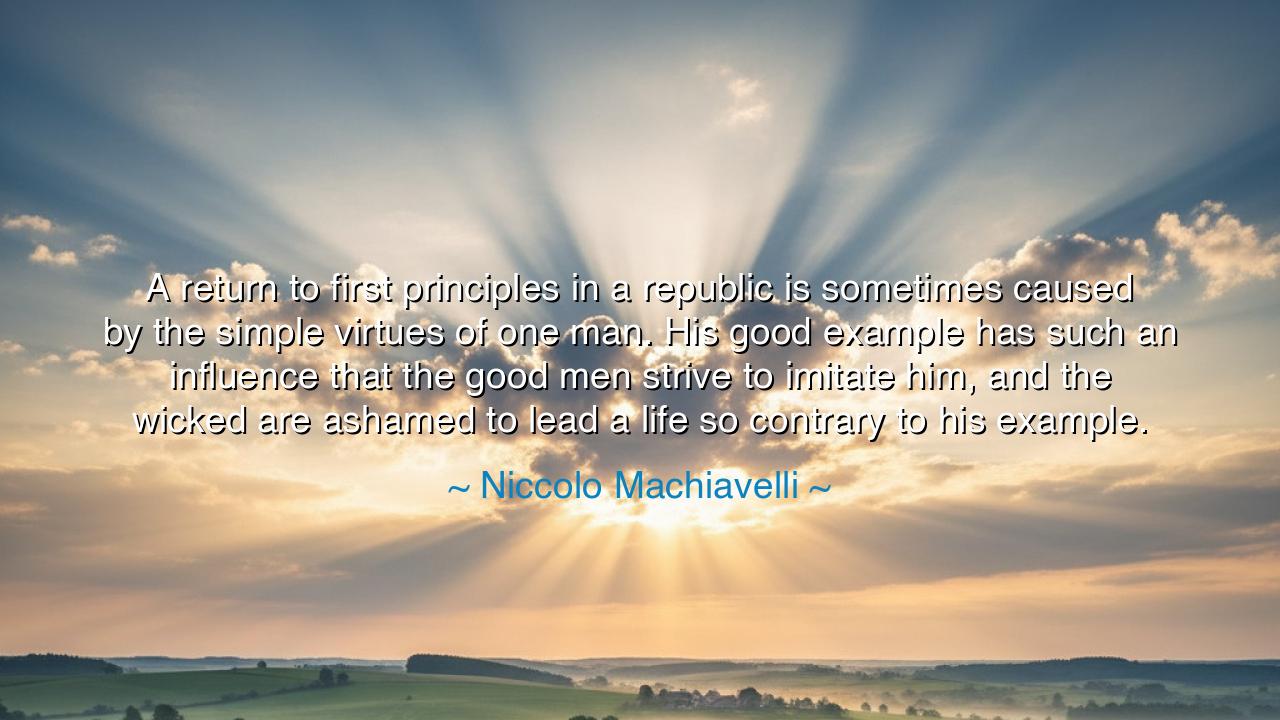
A return to first principles in a republic is sometimes caused by
A return to first principles in a republic is sometimes caused by the simple virtues of one man. His good example has such an influence that the good men strive to imitate him, and the wicked are ashamed to lead a life so contrary to his example.






Hear the grave and piercing voice of Niccolò Machiavelli, who, though remembered for his counsel on power and cunning, also spoke of the force of virtue: “A return to first principles in a republic is sometimes caused by the simple virtues of one man. His good example has such an influence that the good men strive to imitate him, and the wicked are ashamed to lead a life so contrary to his example.” This saying, carved from the observation of history, reveals a paradox both humbling and inspiring—that one man, by the strength of his character alone, may awaken an entire nation to the path of justice.
The origin of these words is Machiavelli’s study of Rome and the Italian city-states, where corruption often ate away at liberty. He saw that laws, institutions, and armies, though necessary, sometimes fail to restore a republic when it drifts into decay. Yet the rise of one righteous figure—a statesman of honor, a general of discipline, a citizen of incorruptible integrity—could shame the wicked and inspire the noble. In such times, the greatness of a single soul becomes like a torch in darkness, reminding a people of the first principles upon which their freedom was built.
History thunders with such examples. Recall Cincinnatus, the Roman farmer who, when called upon to defend the republic, took up the dictatorship only to lay it down again once the crisis was over. His refusal to cling to power became a virtue so luminous that generations of Romans looked upon him as the model of civic duty. The good strove to follow his selflessness, while the wicked, who sought personal gain, were shamed into silence. By his life, not his words, he rekindled the principles of service and sacrifice that had founded the republic.
Think also of George Washington, who, centuries later, walked the same path. Offered the crown of a new nation, he refused it, choosing instead the humility of a president bound by law. His simple virtue of restraint set an example that defined the American republic for generations. His act taught the good that greatness lies in service, not dominion, and it shamed the ambitions of those who would corrupt liberty for personal glory. Like Machiavelli’s vision, here was proof that a single man’s conduct could return a republic to its foundation.
The meaning of Machiavelli’s insight is heroic. He tells us that power is not always the loudest voice or the sharpest sword; sometimes it is the quiet dignity of a man who holds to virtue in a world of corruption. Such a man becomes more than himself—he becomes a mirror for a people, reflecting who they ought to be. By his life, he draws forth the nobility of others, for the good long to rise, and even the wicked cannot bear the weight of his shining contrast.
The lesson is clear: never underestimate the influence of your own example. In times of decay, laws may falter, and leaders may disappoint, but the virtues of one steadfast soul can call forth a return to what is right. Each of us, in our circle, may be that man or woman. By living in honesty when others deceive, by working diligently when others grow slothful, by serving humbly when others seek glory, we may awaken others to goodness, and shame corruption into retreat.
Practical actions follow. Guard your integrity as a sacred flame. Let your words be few, but your deeds speak loudly. In your home, in your labor, in your nation, choose always the virtues that uplift: justice, humility, courage, self-restraint. Know that you may never see the full harvest of your example, yet trust that it will bear fruit in the souls of others. For as Machiavelli reminds us, a republic does not endure only by laws and institutions, but by men and women who, through the nobility of their lives, recall others to the first principles of freedom.
Thus, let us pass this wisdom down: that the virtues of one man may indeed awaken the conscience of a people. Let each listener resolve to be that man, that woman, that example, so that the republic—whether of a nation, a community, or a household—may endure, not in corruption, but in the light of its founding truths.






AAdministratorAdministrator
Welcome, honored guests. Please leave a comment, we will respond soon